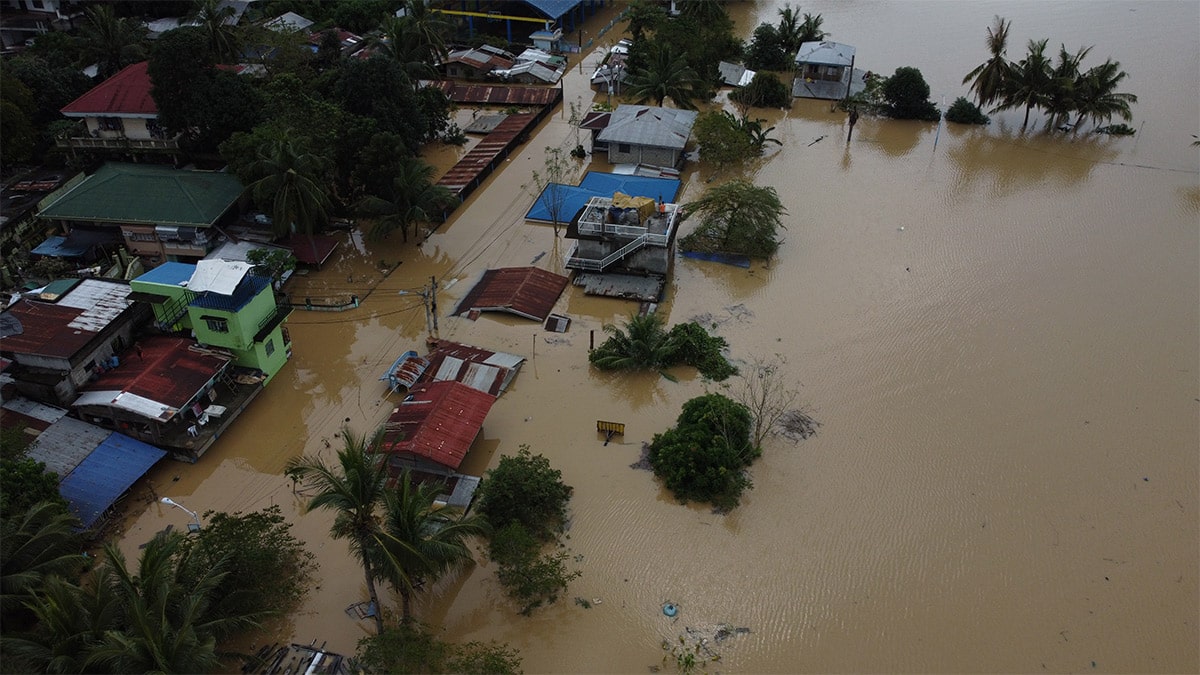

DELUGE. Communities in Ilagan City and the nearby towns of Gamu and Quirino in Isabela were flooded on Nov. 18, 2024 a day after Super Typhoon Pepito crossed northern Luzon. —VILLAMOR VISAYA JR.
MANILA, Philippines — The House of Representatives has approved on final reading a bill that seeks to provide free freight services for relief goods during calamities.
During Tuesday’s session, House Bill (HB) No. 10924 was approved with 182 lawmakers voting in favor of the proposal, with no one voting in the negative or abstaining.
Article continues after this advertisementUnder the bill, the Office of Civil Defense is tasked to lead the National and Regional Logistics Cluster, in coordination with the Department of Transportation (DOTr), the Philippine Postal Corporation (PPC), freight companies, common carriers, private carriers, freight forwarders, and other companies in the implementation once the proposal becomes a law.
FEATURED STORIES NEWSINFO House approves bill seeking employment of seniors on final reading NEWSINFO Pagasa says 3 weather systems to bring cloudy skies, rains Nov 19 NEWSINFO PNP cautions malls vs guards in Christmas costumesFree freight services would then be provided to duly registered relief organizations needing assistance in transporting “emergency relief goods and donated articles to areas declared to be in a state of calamity by the President of the Philippines or by a local government unit.”
“When the area of destination is not accessible, the relief goods shall be delivered and consigned to the local chief executive of the nearest LGU. The areas where these entities operate shall be considered when availing of the free freight services of common carriers, private carriers, freight forwarders, and other logistics companies,” the bill read.
Article continues after this advertisement“The shipping auxiliary cost, such as those for arrastre services, pilotage, and other port charges, as well as the airport charges, such as those for landing and takeoff fees, aircraft parking, navigation charges, and other related airport charges that are routinely passed on to customers, shall be waived by the concerned port and airport authorities,” it added.
Article continues after this advertisementThe release of relief goods should still comply with existing rules.
Article continues after this advertisement“The release of donated relief goods and articles intended for distribution to areas under a state of calamity shall comply with the existing rules and procedures of responsible government agencies such as the Department of Social Welfare and Development (DSWD), Bureau of Customs (BOC), Department of Education, Department of Health, LGUs, and other government agencies authorized to distribute the relief goods and articles,” the bill read.
In 2023, Deputy Speaker Camille Villar and Davao City Rep. Paolo Duterte urged the House to approve the bill due to the Philippines’ nature as a calamity-prone country.
Article continues after this advertisementREAD: Villar calls for free freight services for relief ops
READ: Rep. Duterte wants bills on free freight services for relief ops prioritized
The Philippines has been in the upper range of countries vulnerable to climate change and natural calamities.
According to the 2023 Gross Domestic Climate Risk ranking by the Sydney-based climate-change research firm The Cross Dependency Initiative (XDI), five Luzon provinces were considered the most at-risk areas because of climate-induced disasters.
READ: Global study lists PH provinces at most risk of climate damage
In October 2022, the World Risk Report 2022 by Germany-based Bündnis Entwicklung Hilft and the Institute for International Law of Peace and Armed Conflict at Ruhr University Bochum (IFHV) labeled the Philippines as “the most disaster-prone country in the world” due to its high risk, exposure, and vulnerability to disasters and calamities.
READ: PH most disaster-prone country in the world—study
Just recently, provinces in the eastern part of Luzon and Visayas were hard hit by at least five successive cyclones.
According to the National Disaster Risk Reduction and Management Council, the three most recent tropical cyclones — Nika, Ofel, and Pepito — displaced more than 600,000 people across the country.
Damage was estimated to be P500 million.
Subscribe to our daily newsletter
READ: Typhoon trio aftermath: 600c9taya,000 displaced, P500M in damage
READ NEXT Bicol Region BPSF to focus on rehabilitation, employment, health INQToday: Marcos says he had ‘friendly, productive’ phone ... EDITORS' PICK ‘Amihan’ season begins, says Pagasa LIST: Fiesta Señor 2025 activities Mary Jane Veloso’s transfer to PH facility under discussion – DFA LA Tenorio named new Gilas Youth coach with ‘continuity’ in mind Comelec lists approved areas for mock elections, no date set yet Trump confirms plans to use military in mass deportations MOST READ Poll watchdogs laud Comelec’s update on social media regulations Comelec lists approved areas for mock elections, no date set yet House insists on ‘ayuda’ Senate wants to defund Peso may fall to 59, BSP to intervene Follow @FMangosingINQ on Twitter --> View comments